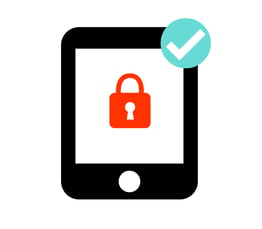Protecting Your EHR Software and Patient Information on Mobile Devices
The use of mobile devices in healthcare practices is on the rise, and for good reason. Mobile devices offer a lot of flexibility and convenience for using EHR Software. Whether you and your staff are in an exam sharing information and materials with patients, or accessing information on-the-go, mobile devices can be a great asset. But, there are security risks associated with using mobile devices that you and your staff should all be aware of if you're using them in your practice, on-the-go, or at home.
Security of your patients' information is a big concern. But IT management might not be your strongest subject, and you might not be aware of the different processes and features that can help keep your devices secure. HealthIT.gov has a ton of great resources to help you learn more about the things that you need to do to ensure security on your devices. We rounded up some of their best tips to help make sure that you are implementing and practicing some of the easiest and most important security processes. And, while we know some of these tips might seem like common knowledge, it's always good to get a reminder!
Tips for Securing Health Information within Your EHR Software on Mobile Devices
General Security and Safety Tips
- Install and activate wiping and/or remote disabling to erase data on your mobile device if lost or
 stolen.
stolen. - Disable and do not install or use file sharing applications.
- Install and enable security software to protect against malicious applications, viruses, spyware, and mal-ware based attacks.
- Keep your security software up-to-date.
- Research mobile apps before downloading.
- Delete all stored health information on your mobile device before discarding it.
- Set preferences to automatically log you off after a short period of inactivity.
- Require the use of unique passwords and user names among your staff, and ensure that they are implementing strong passwords that are changed on a regular basis.
- Bonus Tip: Set your devices to limit the number of unsuccessful log in attempts
Tips for Using Your Mobile Device in Public
- Hide your password from those around you.
- Use a privacy screen so that your information is protected from those around you.
- Don't walk away from your mobile device.
- Don't use an unsecure public Wi-Fi network to view or transmit health information. The risk of using a public Wi-Fi network is that your information can be intercepted between the mobile device and the system connection.
Tips for Using Your Mobile Device in Your Home Office
- Lock your screen when not in use.
- Use a privacy screen to keep information protected.
- Secure your home Wi-Fi network, and change the default administrator user names and passwords.
- Install and turn on your router's firewall.
- What is a firewall? Firewalls protect against unauthorized connections by intercepting incoming and outgoing connection attempts and blocking or permitting them based on a set of rules.
If you're looking for EHR software that is tablet friendly, check out Uprise.

